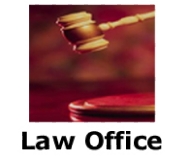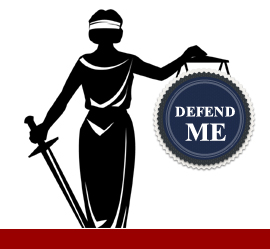|
Have you been a
victim of Robbery
or
charged with Penal
Code 211 - 215 in California?
Have your rights in California
been violated? Have you been falsely accused? We can help.
Contact Us
immediately
for a FREE case evaluation and answers
to your questions Find out
if you have a case in CALIFORNIA and what
to do if you do.
California
Penal Code 211 - 215 :
211. Robbery is the felonious taking of personal property in the
possession of another, from his person or immediate presence, and
against his will, accomplished by means of force or fear.
212. The fear mentioned in Section 211 may be either:
1. The fear of an unlawful injury to the person or property of the
person robbed, or of any relative of his or member of his family;
or,
2. The fear of an immediate and unlawful injury to the person or
property of anyone in the company of the person robbed at the time of
the robbery.
212.5. (a) Every robbery of any person who is performing his or her
duties as an operator of any bus, taxicab, cable car, streetcar,
trackless trolley, or other vehicle, including a vehicle operated on
stationary rails or on a track or rail suspended in the air, and used
for the transportation of persons for hire, every robbery of any
passenger which is perpetrated on any of these vehicles, and every
robbery which is perpetrated in an inhabited dwelling house, a vessel
as defined in Section 21 of the Harbors and Navigation Code which is
inhabited and designed for habitation, an inhabited floating home as
defined in subdivision (d) of Section 18075.55 of the Health and
Safety Code, a trailer coach as defined in the Vehicle Code which is
inhabited, or the inhabited portion of any other building is robbery
of the first degree.
(b) Every robbery of any person while using an automated teller
machine or immediately after the person has used an automated teller
machine and is in the vicinity of the automated teller machine is
robbery of the first degree.
(c) All kinds of robbery other than those listed in subdivisions
(a) and (b) are of the second degree.
213. (a) Robbery is punishable as follows:
(1) Robbery of the first degree is punishable as follows:
(A) If the defendant, voluntarily acting in concert with two or
more other persons, commits the robbery within an inhabited dwelling
house, a vessel as defined in Section 21 of the Harbors and
Navigation Code, which is inhabited and designed for habitation, an
inhabited floating home as defined in subdivision (d) of Section
18075.55 of the Health and Safety Code, a trailer coach as defined in
the Vehicle Code, which is inhabited, or the inhabited portion of
any other building, by imprisonment in the state prison for three,
six, or nine years.
(B) In all cases other than that specified in subparagraph (A), by
imprisonment in the state prison for three, four, or six years.
(2) Robbery of the second degree is punishable by imprisonment in
the state prison for two, three, or five years.
(b) Notwithstanding Section 664, attempted robbery in violation of
paragraph (2) of subdivision (a) is punishable by imprisonment in
the state prison.
214. Every person who goes upon or boards any railroad train, car
or engine, with the intention of robbing any passenger or other
person on such train, car or engine, of any personal property thereon
in the possession or care or under the control of any such passenger
or other person, or who interferes in any manner with any switch,
rail, sleeper, viaduct, culvert, embankment, structure or appliance
pertaining to or connected with any railroad, or places any dynamite
or other explosive substance or material upon or near the track of
any railroad, or who sets fire to any railroad bridge or trestle, or
who shows, masks, extinguishes or alters any light or other signal,
or exhibits or compels any other person to exhibit any false light or
signal, or who stops any such train, car or engine, or slackens the
speed thereof, or who compels or attempts to compel any person in
charge or control thereof to stop any such train, car or engine, or
slacken the speed thereof, with the intention of robbing any
passenger or other person on such train, car or engine, of any
personal property thereon in the possession or charge or under the
control of any such passenger or other person, is guilty of a felony.
215. (a) "Carjacking" is the felonious taking of a motor vehicle in
the possession of another, from his or her person or immediate
presence, or from the person or immediate presence of a passenger of
the motor vehicle, against his or her will and with the intent to
either permanently or temporarily deprive the person in possession of
the motor vehicle of his or her possession, accomplished by means of
force or fear.
(b) Carjacking is punishable by imprisonment in the state prison
for a term of three, five, or nine years.
(c) This section shall not be construed to supersede or affect
Section 211. A person may be charged with a violation of this
section and Section 211. However, no defendant may be punished under
this section and Section 211 for the same act which constitutes a
violation of both this section and Section 211.
118. (a) Every person who, having taken an oath that he or she will
testify, declare, depose, or certify truly before any competent
tribunal, officer, or person, in any of the cases in which the oath
may by law of the State of California be administered, willfully and
contrary to the oath, states as true any material matter which he or
she knows to be false, and every person who testifies, declares,
deposes, or certifies under penalty of perjury in any of the cases in
which the testimony, declarations, depositions, or certification is
permitted by law of the State of California under penalty of perjury
and willfully states as true any material matter which he or she
knows to be false, is guilty of perjury.
This subdivision is applicable whether the statement, or the
testimony, declaration, deposition, or certification is made or
subscribed within or without the State of California.
(b) No person shall be convicted of perjury where proof of falsity
rests solely upon contradiction by testimony of a single person
other than the defendant. Proof of falsity may be established by
direct or indirect evidence.
118.1. Every peace officer who files any report with the agency
which employs him or her regarding the commission of any crime or any
investigation of any crime, if he or she knowingly and intentionally
makes any statement regarding any material matter in the report
which the officer knows to be false, whether or not the statement is
certified or otherwise expressly reported as true, is guilty of
filing a false report punishable by imprisonment in the county jail
for up to one year, or in the state prison for one, two, or three
years. This section shall not apply to the contents of any statement
which the peace officer attributes in the report to any other
person.
118a. Any person who, in any affidavit taken before any person
authorized to administer oaths, swears, affirms, declares, deposes,
or certifies that he will testify, declare, depose, or certify before
any competent tribunal, officer, or person, in any case then pending
or thereafter to be instituted, in any particular manner, or to any
particular fact, and in such affidavit willfully and contrary to such
oath states as true any material matter which he knows to be false,
is guilty of perjury. In any prosecution under this section, the
subsequent testimony of such person, in any action involving the
matters in such affidavit contained, which is contrary to any of the
matters in such affidavit contained, shall be prima facie evidence
that the matters in such affidavit were false.
119. The term "oath," as used in the last two sections, includes an
affirmation and every other mode authorized by law of attesting the
truth of that which is stated.
120. So much of an oath of office as relates to the future
performance of official duties is not such an oath as is intended by
the two preceding sections.
121. It is no defense to a prosecution for perjury that the oath
was administered or taken in an irregular manner, or that the person
accused of perjury did not go before, or was not in the presence of,
the officer purporting to administer the oath, if such accused caused
or procured such officer to certify that the oath had been taken or
administered.
122. It is no defense to a prosecution for perjury that the accused
was not competent to give the testimony, deposition, or certificate
of which falsehood is alleged. It is sufficient that he did give
such testimony or make such deposition or certificate.
123. It is no defense to a prosecution for perjury that the accused
did not know the materiality of the false statement made by him; or
that it did not, in fact, affect the proceeding in or for which it
was made. It is sufficient that it was material, and might have been
used to affect such proceeding.
124. The making of a deposition, affidavit or certificate is deemed
to be complete, within the provisions of this chapter, from the time
when it is delivered by the accused to any other person, with the
intent that it be uttered or published as true.
125. An unqualified statement of that which one does not know to be
true is equivalent to a statement of that which one knows to be
false.
Did You Know?
- In most cases,
the best way to protect your rights is to hire a California
attorney?
Contact Us
immediately
for a FREE case evaluation and answers
to your questions Find out
if you have a case in CALIFORNIA and what
to do if you do.
California
Lawyer - Cities We Serve:
|

Get answers to your
questions about California Sex Crimes. Don't Wait, you have certain
rights that you may lose in time.
California White Collar Crimes
California
Sex Crimes
|





![]()





